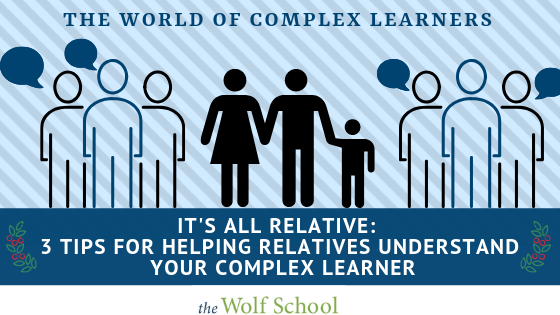3 Tips For Helping Relatives Understand Your Complex Learner
 No matter what holidays you celebrate at this time of year you can pretty much count on seeing relatives that you otherwise don’t spend a lot of time with. As a result, you might get a few raised eyebrows when you give your child chicken nuggets at a big family dinner or Aunt Dotty tells your child to stop rocking in his chair. Maybe your child doesn’t like hugs or family photos. And your child might rip open a present from their grandparents only to show disinterest and move on to something else. There are any number of your child’s behaviors that will get scrutinized and perhaps silently (or not so silently) met with disapproval.
No matter what holidays you celebrate at this time of year you can pretty much count on seeing relatives that you otherwise don’t spend a lot of time with. As a result, you might get a few raised eyebrows when you give your child chicken nuggets at a big family dinner or Aunt Dotty tells your child to stop rocking in his chair. Maybe your child doesn’t like hugs or family photos. And your child might rip open a present from their grandparents only to show disinterest and move on to something else. There are any number of your child’s behaviors that will get scrutinized and perhaps silently (or not so silently) met with disapproval.
Extended family members that you don’t see regularly often don’t understand your child’s diagnoses and resulting social and behavioral difficulties. Complex Learners can’t flip a switch just because family from out of town or grandparents they rarely see come to visit. Some of your family members may have expectations of your child that won’t be met. You may feel pressure about this and even embarrassment at times, especially if you feel that your parenting skills are also under the microscope.
Here are a few tips to help make these situations easier – for both you and your child.
- Support Your Child
Family gatherings are exciting but also a landmine for your child to have difficulty regulating emotions and behaviors. A major reason for this is the fact that Complex Learners just don’t know what to do in these social situations. The more information and strategies you can provide, the more likely things will go more smoothly for your child. Maybe he can show your relatives how to fist bump instead of getting a bear hug. If you’re going to another home, let her know the scene, like how many people will be there, the layout of the house, what time dinner starts or when you are exchanging gifts. Check out this post that gives you tips for previewing and practicing with your child – it can definitely make holiday gatherings easier.
2. Deflecting Negative Comments
Why can’t you make him sit still? She’s not very friendly, is she? Does he always run around and interrupt people? Is she acting silly and talking so loud just to get attention?
You may hear these and other questions or comments, most likely directed at you but possibly directed towards your child as well. At these times you will need to let relatives know a little about your child’s diagnoses without providing a complete evaluation! Explaining that his brain is wired differently or that crowds are difficult for children with sensory issues might be enough. But you also might have to explain that it doesn’t help to talk critically or forcefully to your child. You may have to pull the relative aside and explain things more in depth. And sometimes it might work best to recruit another family member who understands and can validate that your child’s issues stem from complex learning and attention differences, not because you let her do whatever she wants.
3. The Escape Plan
Your child may need a space and some quiet activities to focus on if a family gathering gets overwhelming, but you may need your own space as well. Find a favorite cousin or aunt and go into an unoccupied room or step outside with a hot beverage. Reconnecting with someone who understands your parenting challenges can be validating and relieve some of your stress. You might need a moment to yourself as well. Breath, stretch, walk around the block – these same strategies you encourage for your child may be helpful for you as well.
And don’t feel bad about leaving early. You might wish your child could hang in longer so you’d have more time with relatives, but it’s better to respect your child’s limits, and your own, so that fatigue and family dynamics don’t ruin the evening. If your child has trouble with transitions and leaving places without a meltdown, you can plan an abbreviated visit ahead of time, preparing your child with the time and plan for leaving. A few quick goodbyes may be all you need. Or if your family insists you take home half the leftovers, get those things ready ahead of time and have everything near the door before you escape.
Family can be a joyful and yet sometimes a frustrating part of the holidays for parents with Complex Learners. Remember, it may take a while for some people to understand that your child’s difficulties are related to the way his brain is wired. With good strategies, understanding and a positive attitude, family members can be a support and not an added stress at the holidays.
Want to get notified when there’s a new World of Complex Learners blog post? Subscribe to our blog!
